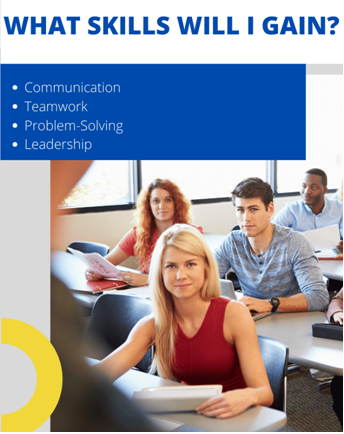
Engaging in social activities is a worthwhile investment for your future, as studies indicate that students who take part in extra-curricular activities beyond their academic studies usually achieve higher grades, score better on exams, and have more positive educational experiences overall.
"Dr. Rhian Meara, a Senior Geography Lecturer at Swansea University, emphasizes that taking a break is essential. It allows you to clear your mind so that you can return revitalized and prepared to participate and excel in your studies."
Engaging in non-academic activities can contribute to enhanced mental and physical well-being by lowering stress, boosting mood, and raising energy levels. According to the GITNUX Benefits of Extra-curricular Activities report, students who participate in extra-curricular activities experience an 8% decrease in feelings of anxiety and depression.
What do we mean by extra-curricular activities?
Co-curricular activities, often referred to as out-of-class activities, encompass any events you engage in beyond your standard academic classes. These can include a variety of pursuits such as sports, clubs, volunteering, and part-time employment.
"The university journey typically encompasses more than merely gaining academic knowledge and earning a degree," states Billy Wong, a professor of education at the University of Reading. "Although engaging in new extra-curricular activities may feel intimidating, it is important to keep in mind that a student's main purpose is to learn."
No matter if you have a love for sports, music, or volunteering or are just looking to explore a new interest, there is a club or activity available for you.
What skills will I gain?
Engaging in extra-curricular activities is an excellent means to showcase transferable skills that enhance your candidacy for graduate positions. Companies seek well-rounded individuals, and involvement in extra-curricular activities indicates your enthusiasm for your interests and equips you with the experience needed to thrive in a professional setting.
Skills that can enhance your CV are:
· Communication
· Teamwork
· Problem-Solving
· Leadership
· Time Management
· Organisation
· Public Speaking
"There is a crossover between the types of skills that students can gain from extra-curricular activities and those that can enhance their academic success," states Professor Wong. "For example, skills such as collaboration, negotiation from various viewpoints, and effective diverse communication methods are probably advantageous in an academic setting."

Three reasons why community service and extra-curricular activities hold significance in college.
Volunteering in the community provides a chance to contribute and create an impact.
Engaging in community service, whether at a soup kitchen or a retirement home, allows you to recognize the needs of your community and the impact you can have on it. It can also encourage you to step outside your comfort zone and foster greater gratitude. We often fail to appreciate how much we have and how fortunate we are until we assist those in need. Community service instils the values of humility and the importance of serving others.
Engaging in extra-curricular activities facilitates a smoother transition to college.
The shift from high school to college can be challenging, but it becomes much easier when you connect with fellow students who are experiencing or have experienced that transition. As you adapt to your new environment, it's important to cultivate friendships and enjoy your leisure time.
Engaging in extra-curricular activities is a great way to meet like-minded individuals and establish those connections. For example, at Marymount, two well-liked extra-curricular options for first-year students are joining the Student Government Association (SGA) and participating in the Saints'Center for Service.
Extra-curricular activities also provide a way to broaden your network. You might be aware that 85 per cent of all jobs are secured through networking, highlighting its significance during your college experience.
As you engage with individuals in various clubs, organizations, and university groups, others will begin to recognize your inherent talents and interests. This connection can often result in internship and job offers from group leaders, faculty, or alums who have interacted with you through these extra-curricular activities.
Engaging in community service and participating in extra-curricular activities offer practical experience in real-life situations.
For every internship or job application, gaining practical experience beyond the classroom is crucial. Engaging in community service and participating in extra-curricular activities can enhance your college resume and distinguish you from others.
Additionally, various external organizations collaborate with student-led clubs and community service initiatives, which can provide a pathway to entering the real world and addressing issues beyond the confines of the university.
Gaining practical experience during your college years is important, so review the list of active clubs and organizations at your school, choose several that interest you, and go to their introductory meetings. You might discover a cause that inspires you or connect with a future mentor.
Volunteering
Volunteering your time for charitable causes is an excellent method to enhance your abilities and network with possible employers. It can broaden your understanding of specific types of work, assist you in figuring out your career path, and provide you with practical experience in competitive fields like conservation.
You can engage in volunteer work with a charitable or non-profit organization, educational institution, medical facility, or community center in your area. There are many opportunities for volunteering across various positions, but certain organizations may ask for relevant experience, training, or expertise, so it's important to investigate before submitting your application.
"Participating could provide you with valuable experience in areas such as finance, health and safety, event management, first aid, and communication," Dr. Meara explains.
Regardless of whether you dedicate a few hours weekly, a few days monthly, or the whole summer, it's important to be practical and ensure that your volunteer commitments do not clash with your university coursework, part-time employment, or other extra-curricular pursuits.













